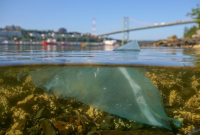Support strong Canadian climate journalism for 2025
The secret ingredient to some long-lasting makeup looks could be toxins that pose long-term hazards to human and environmental health, suggests a new study by University of Toronto researchers.
A paper published Tuesday in Environmental Science & Technology Letters finds that many common cosmetic products contain signs of a class of chemicals known as polyfluoroalkyl substances — or PFAS — that can contaminate water systems for generations and have been linked to serious health risks.
Co-author Miriam Diamond says the research raises concerns that a lack of reporting standards in the cosmetics industry could mean many Canadian makeup wearers are inadvertently applying harmful chemicals to their faces every day.
"We can't afford to contaminate our drinking water as well as our bodies," said Diamond, an earth sciences professor at University of Toronto. "Is your beauty worth taking a risk with your health?"
PFAS are a group of synthetic chemicals that can be commonly found in many industrial and consumer products, including firefighting foams, textiles, cookware and food packaging.
In recent years, however, Diamond said PFAS have come under increased scrutiny amid mounting evidence linking the persistence of these "forever chemicals" in drinking water and the human body to health concerns including metabolic dysregulation, fertility issues and immune dysfunction.
Several studies have detected PFAS in cosmetics purchased in Europe and Asia, presumably to make cosmetic products longer lasting, more durable and easier to apply, said Diamond.
But the use of PFAS in makeup also creates new risks of exposure, including absorption through the skin and tear ducts or accidental ingestion, especially for lip products.
There are also concerns that waste from these products will find its way into drinking water supplies after being washed down the drain or thrown out in landfills, Diamond said.
There was no data on the prevalence of PFAS in the North American makeup industry, so Diamond and her Toronto colleagues teamed up with U.S. researchers to test 231 cosmetics products, including 17 from Canada, available at major beauty retailers and drugstores.
The products were tested for high levels of fluorine, which would strongly suggest the presence of PFAS, said Diamond.
Of the cosmetics tested, most products of concern were billed as "waterproof," "wear-resistant" or "long-lasting," she said.
Eighty-two per cent of waterproof mascaras had high fluorine concentrations, as well 58 per cent of other eye products, 55 per cent of all lip products and nearly two-thirds of foundations.
The scientists sent 29 of these high-fluorine products for further analysis, and detected at least four specific PFAS, including some that convert into chemicals that are toxic and harmful to the environment.
Moreover, the researchers identified breakdown products from fluorine-containing polymers — long chains of repeating chemicals — that cast doubt on manufacturers' claims that these compounds are more environmentally friendly, said Diamond.
Of the 17 Canadian products analyzed in the study, only one listed PFAS on the ingredients, said Diamond.
The Canadian government has committed to look into the entire class of PFAS, which Diamond said she hopes will lead to better oversight of their use in the cosmetics industry.
But even as that process plays out, Diamond called on beauty manufacturers and retailers to immediately suspend the use and sale of products containing PFAS.
"We don't need to wait for more fact-finding," she said. "Let's not conduct an experiment on the use of PFAS in cosmetics on ourselves."
This report by The Canadian Press was first published June 15, 2021.





Comments